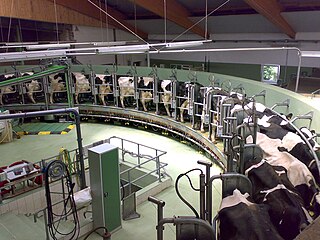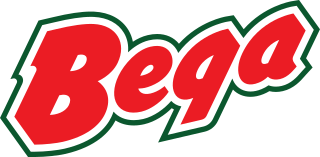
Milk is a white liquid food produced by the mammary glands of mammals and the caecilian Siphonops annulatus. It is the primary source of nutrition for young mammals before they are able to digest solid food. Immune factors and immune-modulating components in milk contribute to milk immunity. Early-lactation milk, which is called colostrum, contains antibodies that strengthen the immune system and thus reduce the risk of many diseases. Milk contains many nutrients, including protein and lactose.

Casein is a family of related phosphoproteins that are commonly found in mammalian milk, comprising about 80% of the proteins in cow's milk and between 20% and 60% of the proteins in human milk. Sheep and cow milk have a higher casein content than other types of milk with human milk having a particularly low casein content.

Dairy farming is a class of agriculture for the long-term production of milk, which is processed for the eventual sale of a dairy product. Dairy farming has a history that goes back to the early Neolithic era, around the seventh millennium BC, in many regions of Europe and Africa. Before the 20th century, milking was done by hand on small farms. Beginning in the early 20th century, milking was done in large scale dairy farms with innovations including rotary parlors, the milking pipeline, and automatic milking systems that were commercially developed in the early 1990s.

Fonterra Co-operative Group Limited is a New Zealand multinational publicly traded dairy co-operative owned by New Zealand farmers. The company is responsible for approximately 30% of the world's dairy exports and with revenue exceeding NZ $22 billion, making it New Zealand's largest company. It is the sixth-largest dairy company in the world as of 2022, as well as the largest in the Southern Hemisphere.

Powdered milk, also called milk powder, dried milk, or dry milk, is a manufactured dairy product made by evaporating milk to dryness. One purpose of drying milk is to preserve it; milk powder has a far longer shelf life than liquid milk and does not need to be refrigerated, due to its low moisture content. Another purpose is to reduce its bulk for the economy of transportation. Powdered milk and dairy products include such items as dry whole milk, nonfat (skimmed) dry milk, dry buttermilk, dry whey products and dry dairy blends. Many exported dairy products conform to standards laid out in Codex Alimentarius.
Inner Mongolia Mengniu Dairy (Group) Limited by Share Ltd. is a Chinese manufacturing and distribution company of dairy products and ice cream. The company is headquartered in Hohhot, Inner Mongolia and manufactures dairy products under the Mengniu brand.

A2 milk is a variety of cows' milk that mostly lacks a form of β-casein proteins called A1, and instead has mostly the A2 form. Cows' milk like this was brought to market by The a2 Milk Company and is sold mostly in Australia, New Zealand, China, and the United States. It was sold in the United Kingdom between 2012 and 2019. Non-cow milk, including that of humans, sheep, goats, donkeys, yaks, camels, buffalo, and others, also contain mostly A2 β-casein, and so the term "A2 milk" is also used in that context.

Almarai Company is a Saudi multinational dairy company which is listed on the Tadawul stock exchange. It specializes in food and beverage manufacturing and distribution. The company's main offices are located in Riyadh, Saudi Arabia.

Westland Milk Products is a dairy company based in Hokitika, New Zealand. It has been owned by Chinese dairy company Yili Group since 2019. It is the third largest dairy processor in New Zealand with a 3.4% market share.

Yili Group is a Chinese dairy products producer headquartered in Hohhot, Inner Mongolia. It is one of China's leading dairy companies alongside Mengniu, and is listed as an A share company on the Shanghai Stock Exchange (SSE). It is engaged in processing and manufacturing of milk products, including ice cream, milk tea powder, sterilized milk and fresh milk under "Yili" brand, powdered milk under "Pro-Kido" brand, and organic milk under "Satine" brand. In 2018, it is the world's third best-performing food brands. In 2021, Yili ranked 1st on FBIF's Top 100 Chinese Food & Beverage Companies list. It is partly state-owned by the government of Hohhot.

The 2008 Chinese milk scandal was a significant food safety incident in China. The scandal involved Sanlu Group's milk and infant formula along with other food materials and components being adulterated with the chemical melamine, which resulted in kidney stones and other kidney damage in infants. The chemical was used to increase the nitrogen content of diluted milk, giving it the appearance of higher protein content in order to pass quality control testing. 300,000 affected children were identified, among which 54,000 were hospitalized, according to the latest report in January 2009. The deaths of six babies were officially concluded to be related to the contaminated milk.
Guangdong Yashili Group Co., Ltd. is a leading privately owned infant formula and soymilk products company in China. Based in Chaoan in the Chaozhou region of the Guangdong Province, China and, incorporated in the Cayman Islands. The company also has a Hong Kong-listed entity Yashili International Holdings Limited.
Landcorp Farming Limited ("Landcorp") is a state-owned enterprise of the New Zealand government. Its brand name is Pāmu, the Te Reo Māori word 'to farm'. Its core business is pastoral farming including dairy, sheep, beef and deer, as well as a Foods business marketing milk and meat products globally under the Pāmu brand and as a supplier to other food processors. Pāmu manages 117 properties carrying over 1 million stock units on 365,257 hectares of property under management.

In New Zealand, agriculture is the largest sector of the tradable economy. The country exported NZ$46.4 billion worth of agricultural products in the 12 months to June 2019, 79.6% of the country's total exported goods. The agriculture, forestry and fisheries sector directly contributed $12.653 billion of the national GDP in the 12 months to September 2020, and employed 143,000 people, 5.9% of New Zealand's workforce, as of the 2018 census.

Dairy farming in New Zealand began during the early days of colonisation by Europeans. The New Zealand dairy industry is based almost exclusively on cattle, with a population of 4.92 million milking cows in the 2019-20 season. The income from dairy farming is now a major part of the New Zealand economy, becoming an NZ$13.4 billion industry by 2017.

The a2 Milk Company Limited is a dual listed NZX and ASX 50 public listed company that commercialises intellectual property relating to A1 protein-free milk that is sold under the a2 and a2 Milk brands, as well as the milk and related products such as infant formula.

The Bega Group is an Australian diversified food and drinks company with manufacturing sites in New South Wales, Queensland, Western Australia and Victoria. Founded as an agricultural cooperative in the town of Bega, New South Wales by their dairy suppliers, it became a public company in 2011 when it listed on the Australian Securities Exchange. Close to half of shares publicly traded are still held by Bega's farmer-suppliers. It is currently one of the largest companies in the dairy sector in Australia, with a base milk supply in 2018 of approximately 750 million litres per annum.
Pearl Dairy Farms Limited, often referred to as Pearl Dairy, is a dairy processing company in Uganda.
Central Institute for Research on Buffaloes, Hisar, a publicly funded, institute for water buffalo research. It is located 170 kilometres (110 mi) from Delhi, at Hisar in the north Indian state of Haryana. It has a sub-campus, Bir Dosanjh, at Nabha. CIRB operates a nationwide network of 10 research centres working on breed improvement of the 7 main native breeds. CIRB, with over 20 laboratories for buffalo research, is the world's largest buffalo research institute with the widest range of breeds under study. With the aim of improving breeds and dissemination of information, CIRB has sold over 1,000 bulls, conducted ~200,000 artificial insemination in the field for the farmers' buffaloes with a 41% conception rate, distributed ~520,000 progeny tested frozen semen kits to 45,000 farmers and over 250 institutes, imparted training to several thousand farmers on advanced buffalo husbandry, and created the world's first online Buffalopedia in several languages. It has a large research partner network across India and the globe. It is the second institute to successfully clone a buffalo in 2016, after the first successful cloning was achieved by the National Dairy Research Institute, Karnal in 2010. In July 2017, the Indian Council of Agricultural Research ranked CIRB Hisar as India's number one Buffalo research institute for the year 2016–17.

Milky Mist Dairy, Milky Mist Dairy Food Private Limited (MMD), one of India's largest manufacturers of dairy products, is located at Perundurai, 20 km (12 mi) from the Erode district in Tamil Nadu. Formed in 1997 by T. Sathish Kumar, Milky Mist is engaged in milk procurement, processing, and manufacturing of other dairy products. K Rathnam is the CEO of Milky Mist and dairy industry expert.















